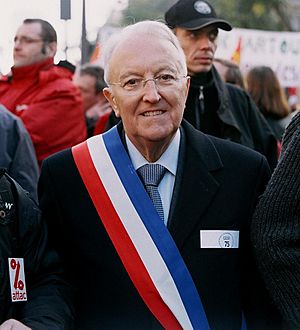Georges Sarre facts for kids
Quick facts for kids
Georges Sarre
|
|
|---|---|

Georges Sarre in 2005
|
|
| Mayor of the 11th arrondissement of Paris | |
| In office 3 July 1995 – 29 March 2008 |
|
| Preceded by | Alain Devaquet |
| Succeeded by | Patrick Bloche |
| Member of the National Assembly for Paris's 6th constituency |
|
| In office 2 April 1993 – 18 June 2002 |
|
| Preceded by | Jean-Yves Autexier |
| Succeeded by | Danièle Hoffman-Rispal |
| Personal details | |
| Born | 26 November 1935 Chénérailles, France |
| Died | 31 January 2019 (aged 83) Paris, France |
| Political party | Citizen and Republican Movement |
Georges Sarre was a French politician. He was born on November 26, 1935, and passed away on January 31, 2019. He was an important leader of the Citizen and Republican Movement political party.
Contents
Early Political Life
Georges Sarre joined the Socialist Party (PS) in 1971. This was at a famous meeting called the Epinay Congress. He quickly became a supporter of two important politicians, Jean-Pierre Chevènement and François Mitterrand.
In 1977, Sarre was the Socialist Party's main candidate for the Paris local elections. He ran for mayor but lost by a small number of votes to Jacques Chirac.
Serving in Government
Sarre was elected as a Member of the European Parliament (MEP) in 1979. This meant he represented France in the European Parliament.
In 1981, he was elected to the French National Assembly for Paris. The National Assembly is like the main parliament in France.
From 1988 to 1993, he held a special job as Secretary of State. He was in charge of road and river transportation. He served in the governments led by Michel Rocard, Édith Cresson, and Pierre Bérégovoy.
Later, from 1995 to 2008, he served as the Mayor of the 11th arrondissement of Paris. An arrondissement is like a district or borough within a big city.
Forming a New Party
In 1993, the Socialist Party faced a big defeat in the French elections. However, Georges Sarre was re-elected in his area of Paris. His area was the only one not won by the right-wing parties in that election.
Around this time, Sarre disagreed with some of the Socialist Party's new ideas. He felt they were becoming too focused on free markets. So, he joined Jean-Pierre Chevènement to create a new party. This party was first called the Citizens' Movement (MDC).
The MDC later changed its name to the Republican Pole in 2002. After that, it became known by its current name, the Citizen and Republican Movement (MRC).
Later Elections and Leadership
Georges Sarre strongly supported Jean-Pierre Chevènement when he ran for president in 2002. He also helped prepare for Chevènement to run again in 2007. However, Chevènement decided not to run in 2007. Instead, he supported the Socialist candidate, Ségolène Royal.
In the 2002 French elections, Sarre lost his seat in the National Assembly. He was defeated by another Socialist politician, Danièle Hoffman-Rispal.
Before the 2007 presidential and legislative elections, the MRC party supported Ségolène Royal. In return, the Socialist Party supported Sarre's candidacy in a different area, Creuse's 2nd constituency. Even without opposition from the Socialist Party, he lost the election to the sitting member, Jean Auclair.
Georges Sarre was often seen as a co-leader of the MRC party alongside Chevènement. Even though Chevènement was the official President of the MRC, Sarre played a very important role.
See also
In Spanish: Georges Sarre para niños
 | William L. Dawson |
 | W. E. B. Du Bois |
 | Harry Belafonte |

